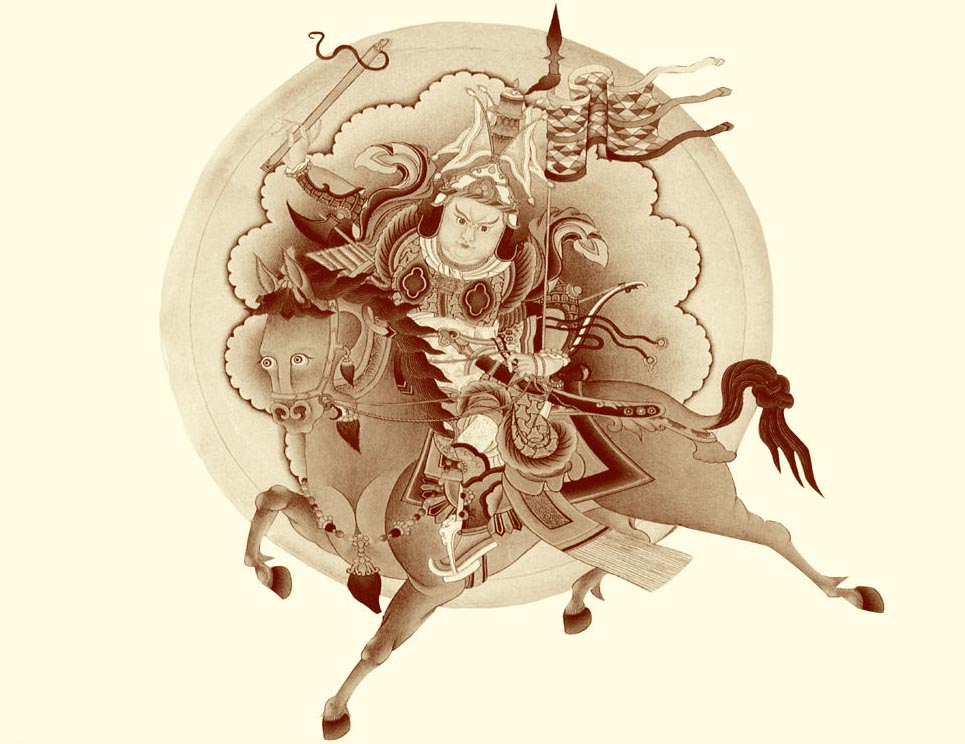 |
| Cowboy hat my dad .... so stylish LOL |
“The epic relates the heroic achievements of Gesar, the superhuman warrior ruler of the Kingdom of Ling, who waged war with the nearby Kingdom of Hor. Distinctly Tibetan in style, the epic appears to date from time of the second transmission of Buddhism to Tibet. Gesar is said to have lived without fear of his rather formidable enemies, subdued monsters, helped the poor and controlled the strong, and brought benefits to the common people”.
To Tibetans, and much of Central Asia, King Gesar is a hero. “He is said to have been born in
 the 11th century. During his childhood he spent his time as a shepherd and later married “Zhumao” and with her brother built an army of tens of thousands under 30 generals. After defeating their enemies, they established the State of Ling with Ozhu as its base. The Chinese acknowledge that Gesar fought in present-day Golog, Yushuo, Garze, Xinlong, Daofu, Seda, Luohuo, Aba and Qamdo. His generals were granted land in Baiyu, Dengke, Shiqu, Golog, Yushu and Qamdo”.
the 11th century. During his childhood he spent his time as a shepherd and later married “Zhumao” and with her brother built an army of tens of thousands under 30 generals. After defeating their enemies, they established the State of Ling with Ozhu as its base. The Chinese acknowledge that Gesar fought in present-day Golog, Yushuo, Garze, Xinlong, Daofu, Seda, Luohuo, Aba and Qamdo. His generals were granted land in Baiyu, Dengke, Shiqu, Golog, Yushu and Qamdo”.In old age, Gesar of Ling decided to return home from Chamdo where he had been residing. Legend says that at Dengke, his horse was startled by a dog, and the king was thrown and died. ( courtesy Tibet Talk by Jigme Duntak )
In memory of the Great King Gesar on the 15th of July which was also the 15th day of the Tibetan calendar, The ling Gesar day or so i coined myself , my family ( Dad me and uncle) and our other Khamba neighbours went up to Yotongla pass which is an hour drive from Trongsa to hoist and hang our prayer flags. Accompanying us were two monks from the dzong and some fellow helpers to climb the trees.
We first lit a huge pile of coniferous leaves to create clouds of smoke that blended gently with the mist, It almost felt like we were invoking the spirit of Ling Gesar himself. The monks began chanting the rituals after blessing the prayers flags we set about climbing trees and hanging the prayer flags from one tree to another. I complained about my shoes being buried ankle deep in the marshy soil much to my dad's annoyance lol. The older lot started with nailing prayer flags on barren available prayer poles. I felt so invincible almost like Ling Gesar himself when I along with a fren carried a two storied in length huge prayer pole on our shoulder from one hill to another, making sure to be careful along the way so as not to snap the long pole with our movement .
Moments inside the wood amids the mossy coniferous forest much as I hate to admit i couldn't help feeling like Edward from the vampire series waiting for a Bella to to appear from behind the trees haha ( blame my over imaginative Saggitarian mind ).
We said our prayers and hoped the sailing flags would carry all our ills and bad luck away. The tedious task was followed by lunch in the misty drizzle which showed signs of turning into a full fledged rain. My dad and elders told stories of Tibet to the two native monks from Trongsa , at this very moment as we sit and eat , folks back in Tibet were dancing, horse racing in the meadows , singing and stories of merriment and courtship amongst the younger lot was a general trend. Sigh!! how my heart longed to be in Tibet for a moment in time to witness the Khamba Edwards and Bellas and more :)
Cheers to the months to come along!! Bad luck be gone.
PS : did not have the leisure to take many pics as the elders thought i was avoiding work LOL
We said our prayers and hoped the sailing flags would carry all our ills and bad luck away. The tedious task was followed by lunch in the misty drizzle which showed signs of turning into a full fledged rain. My dad and elders told stories of Tibet to the two native monks from Trongsa , at this very moment as we sit and eat , folks back in Tibet were dancing, horse racing in the meadows , singing and stories of merriment and courtship amongst the younger lot was a general trend. Sigh!! how my heart longed to be in Tibet for a moment in time to witness the Khamba Edwards and Bellas and more :)
Cheers to the months to come along!! Bad luck be gone.
PS : did not have the leisure to take many pics as the elders thought i was avoiding work LOL










such a beautiful narrative-- our elders really have so much to teach us and great job to you for sharing this
ReplyDeleteI love this XOXO
ReplyDelete